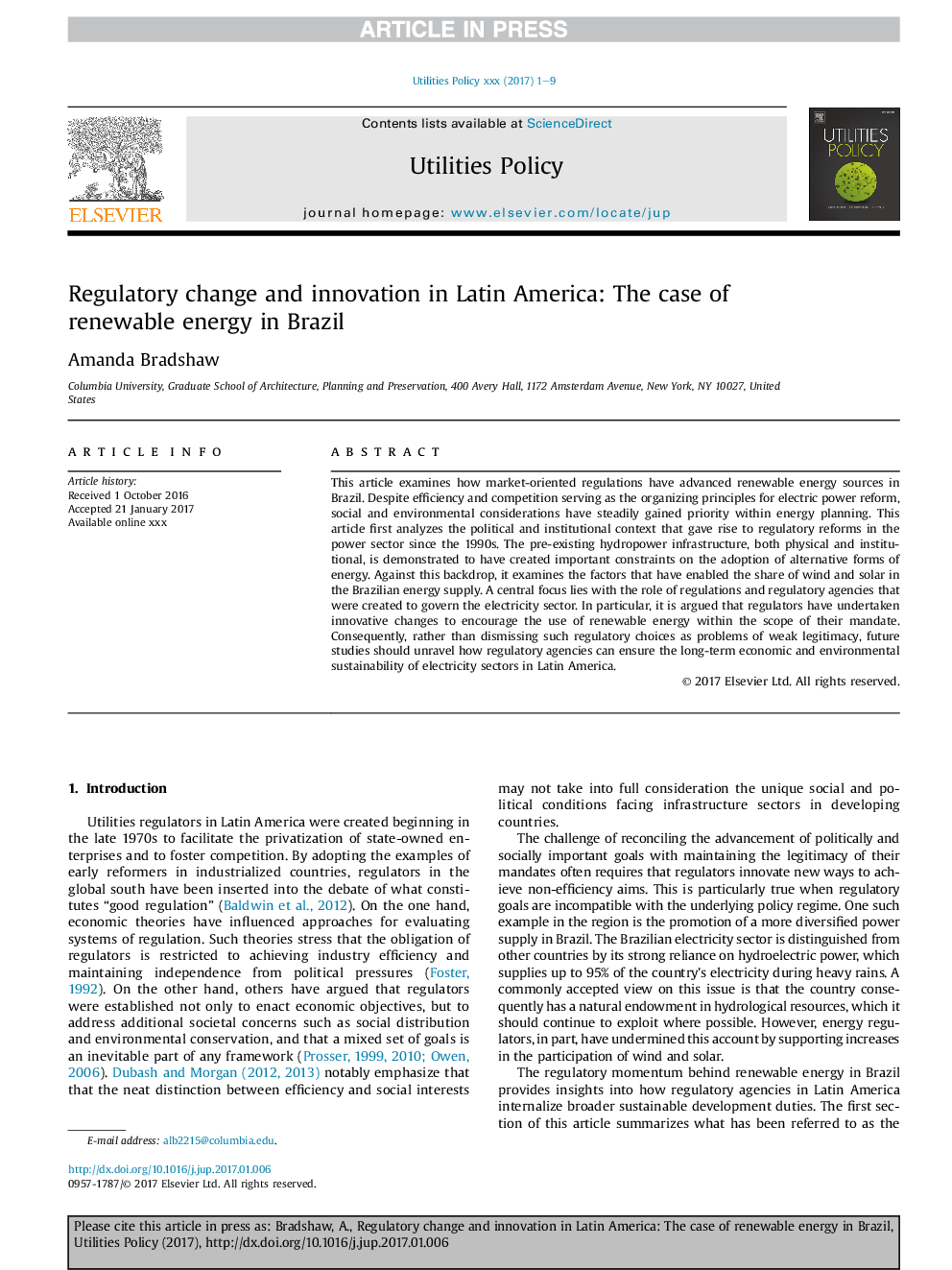| کد مقاله | کد نشریه | سال انتشار | مقاله انگلیسی | نسخه تمام متن |
|---|---|---|---|---|
| 7411414 | 1481649 | 2017 | 9 صفحه PDF | دانلود رایگان |
عنوان انگلیسی مقاله ISI
Regulatory change and innovation in Latin America: The case of renewable energy in Brazil
ترجمه فارسی عنوان
تغییرات قانونی و نوآوری در آمریکای لاتین: مورد انرژی تجدید پذیر در برزیل
دانلود مقاله + سفارش ترجمه
دانلود مقاله ISI انگلیسی
رایگان برای ایرانیان
ترجمه چکیده
در این مقاله بررسی شده است که چگونه مقررات بازار گرا پیشرفته منابع انرژی تجدیدپذیر در برزیل است. علیرغم کارایی و رقابت که به عنوان اصول سازماندهی برای اصلاحات برق مورد استفاده قرار می گیرد، ملاحظات اجتماعی و محیط زیست به طور پیوسته در برنامه ریزی انرژی به دست آورده اند. این مقاله ابتدا زمینه سیاسی و نهادی را که از دهه 1990 به اصلاحات نظارتی در بخش برق منجر شده است، تحلیل می کند. به نظر می رسد که زیرساخت های برق آبی موجود، هم فیزیکی و هم نهادی، مانع مهمی برای پذیرش فرم های جایگزین انرژی است. در مقابل این فاکتور، فاکتورهایی را بررسی می کند که سهم باد و خورشید را در تامین انرژی برزیل افزایش داده است. تمرکز مرکزی بر نقش مقررات و آژانس های نظارتی است که برای مدیریت بخش برق ایجاد شده اند. به طور خاص استدلال شده است که تنظیم کننده ها تغییرات ابتکاری را برای تشویق استفاده از انرژی تجدید پذیر در محدوده مجوز خود اعمال کرده اند. درنتیجه، به جای اخراج از چنین انتخابات نظارتی به عنوان مشکالت مشروعیت ضعیف، مطالعات آینده باید از بین برود که چگونه آژانس های نظارتی می توانند پایدار اقتصادی و محیط زیستی بخش های برق در آمریکای لاتین را تضمین کنند.
موضوعات مرتبط
مهندسی و علوم پایه
مهندسی انرژی
انرژی (عمومی)
چکیده انگلیسی
This article examines how market-oriented regulations have advanced renewable energy sources in Brazil. Despite efficiency and competition serving as the organizing principles for electric power reform, social and environmental considerations have steadily gained priority within energy planning. This article first analyzes the political and institutional context that gave rise to regulatory reforms in the power sector since the 1990s. The pre-existing hydropower infrastructure, both physical and institutional, is demonstrated to have created important constraints on the adoption of alternative forms of energy. Against this backdrop, it examines the factors that have enabled the share of wind and solar in the Brazilian energy supply. A central focus lies with the role of regulations and regulatory agencies that were created to govern the electricity sector. In particular, it is argued that regulators have undertaken innovative changes to encourage the use of renewable energy within the scope of their mandate. Consequently, rather than dismissing such regulatory choices as problems of weak legitimacy, future studies should unravel how regulatory agencies can ensure the long-term economic and environmental sustainability of electricity sectors in Latin America.
ناشر
Database: Elsevier - ScienceDirect (ساینس دایرکت)
Journal: Utilities Policy - Volume 49, December 2017, Pages 156-164
Journal: Utilities Policy - Volume 49, December 2017, Pages 156-164
نویسندگان
Amanda Bradshaw,
